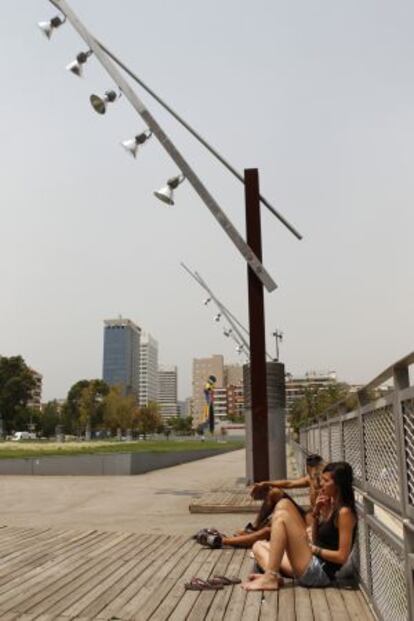Remove my fake Latina lamps, architect tells Doha
Beth Galí saw design stolen and then bungled by Qatari capital


For someone to steal your idea is irritating. For them to do it deceitfully, after kicking you out of a public competition, is even more infuriating. But if, additionally, the copy is a cheap, slipshod affair that makes you lose money and prestige, it's enough to tear your hair out.
That is the situation that Catalan architect Beth Galí says she finds herself in. Last week Galí filed a suit in a Barcelona court against the emirate of Qatar, which has installed 1,000 street lamps designed by herself on the main avenue of the capital, Doha.
The trouble is, she was never paid for it.
"It cannot be that Asia spends its time copying what Europe has thought up and designed. What will be left for us if they take away our creativity, our talent and our thoughts?" Galí asks. "It is plagiarism on a planetary scale."
Her 16-meter high Latina street lamps are already present in Barcelona, Rotterdam and Hamburg. But the fake ones on Al Waab Avenue in Doha are so poorly made that they have caused all kinds of serious trouble. Some are standing in the wrong places and dazzle drivers as they go by; others are made with low-quality materials that rust and make the lamps more likely to collapse; even worse, some of the spotlights have fallen off the lamps and caused fatal accidents.
These accidents have damaged Galí's international prestige. "If I'd been copied by a master, I might still be happy. But this is atrocious."
The Catalan company that holds the patent, Santa&Cole, has also noticed a decline in commissions since Qatar installed the faulty lamps, according to the firm's president Javier Nieto.
In 2005, Santa&Cole won a public competition to install the street lamps in Doha, but after turning in the final plans, the public company Ashghal told the Catalan entrepreneurs that Qatar was no longer interested in the project. That should have been the end of this particular story.
Instead, the emirate appropriated the idea and had a Chinese company make 1,000 units at a lower price. However, the spate of constant accidents forced Ashghal to get in touch with Santa&Cole, whose executives thus discovered the intellectual property theft.
Since then, and despite mediation from Spanish authorities and even the United Nations, the emirate has refused to reach a mutually acceptable settlement and Galí has finally lost her patience.
"Enough is enough. We cannot tolerate these situations," says the architect, who is asking for 100,000 euros in moral damages and for the 1,000 fake street lamps to be removed from the streets of Doha.
The design school Barcelona Centre de Disseny is supporting Galí in her fight. Its president, Pau Herrera, says that this attack on intellectual property "hurts the image of Barcelona" and that design and innovation should get greater protection.
Tu suscripción se está usando en otro dispositivo
¿Quieres añadir otro usuario a tu suscripción?
Si continúas leyendo en este dispositivo, no se podrá leer en el otro.
FlechaTu suscripción se está usando en otro dispositivo y solo puedes acceder a EL PAÍS desde un dispositivo a la vez.
Si quieres compartir tu cuenta, cambia tu suscripción a la modalidad Premium, así podrás añadir otro usuario. Cada uno accederá con su propia cuenta de email, lo que os permitirá personalizar vuestra experiencia en EL PAÍS.
¿Tienes una suscripción de empresa? Accede aquí para contratar más cuentas.
En el caso de no saber quién está usando tu cuenta, te recomendamos cambiar tu contraseña aquí.
Si decides continuar compartiendo tu cuenta, este mensaje se mostrará en tu dispositivo y en el de la otra persona que está usando tu cuenta de forma indefinida, afectando a tu experiencia de lectura. Puedes consultar aquí los términos y condiciones de la suscripción digital.








































